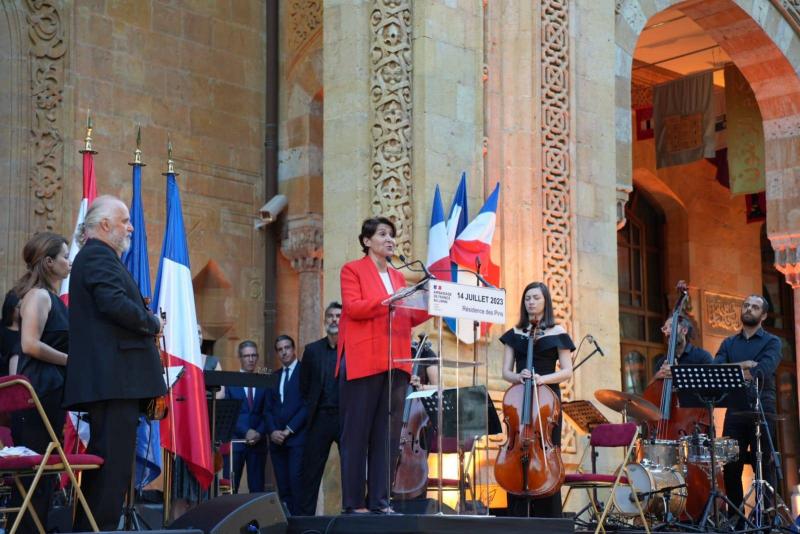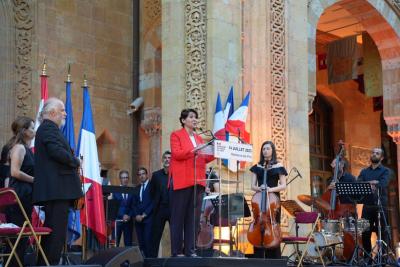On the anniversary of the French National Day, the French Ambassador to Lebanon, Anne Grillo, seemed to have taken off her diplomatic gloves and addressed Lebanese leaders with a written speech that was more about reprimand than anything else. The prepared remarks she delivered from the Pine Palace were deliberate and intended for her visitors from all political factions, first and foremost, and for the general Lebanese public secondly, especially since this speech was her last before leaving Lebanon to conclude her mission.
With the "quorum" completed at the Pine Palace by political, diplomatic, and social figures, and after the national anthems of Lebanon and France, Ambassador Grillo expressed her concern for Lebanon's future, stating: "I feel—with great apprehension—the size of the challenges that still need to be overcome for Lebanon to regain its rightful place in the Middle East and in relation to its partners and friends." She noted that when she assumed her duties in October 2020, she arrived in a devastated Beirut, due to the port explosion, and Lebanon was then "down on the ground," and "I discovered then a state that is absent, and still is."
She continued, "Dear friends, Lebanon is not well; it pleases some to think today that the crisis has been overcome, but the current stability is deceptive." She pointed out that if we consider the significant aid provided by the Lebanese diaspora and the international community, "the concerning matter is that this economy feeds off the increasing entrenchment of money laundering and organized crime that is spreading throughout the Mashreq," driven by Syria, which has become, in her words, a "drug state." She compared Lebanon to a person experiencing amputation, as its vital forces and youth leave it "in search of more compassionate horizons because they have grown weary of being sacrificed on the altar of maintaining a system that is unable to renew itself."
**Fear of the Other**
The French ambassador did not stop there; she spoke of the fears that plague the Lebanese, saying, "if we set aside the cavalier attitude, patronage, illegal trade, and corruption, what is eating away at Lebanon today at its core? It is fear—the fear of the other, for these ghosts of conflicts still haunt those who engaged in these conflicts and who may desire to rekindle its sparks to engulf the Lebanese community in flames." However, the fear that consumes the Lebanese she encountered is primarily the fear of not finding medication for a family member suffering from cancer and the fear of not being able to pay for a child's school fees or secure sustenance for them.
She believes that tackling these fears requires sustainable solutions, while some say that the time has come to reconsider Lebanon's regional organization, referring to federal proposals. "I respond to them that we must start implementing the decentralization stipulated in the Taif Agreement." She emphasized that no country can escape its external geography or internal map, and Lebanon's message ought to be one of a gateway between East and West, and a space for peaceful coexistence among all who have found refuge there throughout history.
Regarding these fears and harmful tendencies that find fertile ground in the economic crisis and the halt of political institutions, she stated that there has been no president for nine months to raise Lebanon's voice on the international stage, noting that "your country has been absent from the international agenda while the Middle East witnesses major developments, and the government is only concerned with handling current affairs, and the parliament is no longer legislating. It is a deadly paralysis for Lebanon and the Lebanese."
Grillo asked where Lebanon could be today without the international community's assistance to the army, security forces, schools, and hospitals.
**Le Drian and the Rare Presence**
On the appointment of former Foreign Minister Jean-Yves Le Drian as a special envoy from the French presidency to Lebanon, Ambassador Grillo clarified that the President's step of proposing Le Drian's mediation aims to "bring together the countries of the region and the international community that are still concerned about Lebanon's future, where its presence has become rare." It also seeks to provide the necessary conditions for a calm dialogue between parties that do not communicate with each other, knowing that it is their responsibility to elect a president and form a government to work for the benefit of Lebanon and the Lebanese. The goal is not to replace the Lebanese parties but to attempt to accompany the re-launch of institutional machinery, "as this is a prerequisite that must be met to curb the collapse of Lebanon and its state."
Delegations and representatives of presidents and political forces, along with a number of ambassadors, attended the Pine Palace to participate in the French National Day or "Bastille Day," which commemorates the storming of the Bastille prison in 1789 and the victory of the French Revolution over the monarchy that existed at the time. In 1880, the Third Republic in France established July 14, the anniversary of the Bastille's storming (1789), as a national holiday uniting all French people.




